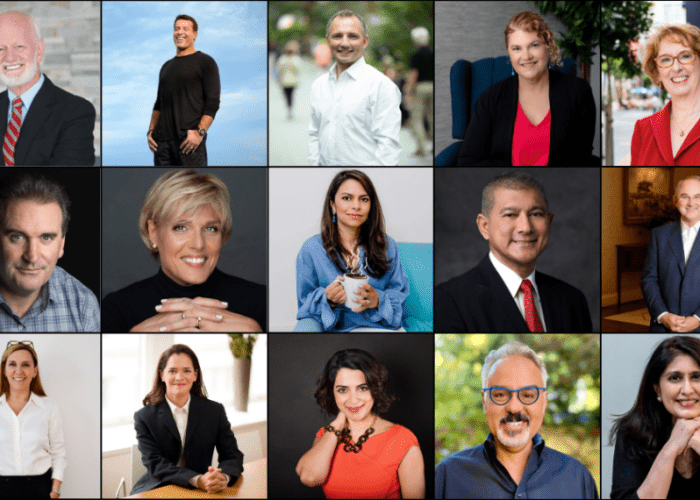January 14, 2019 – Interview with Caroline Adams Miller by Gwen Moran
Somewhere between one and many is the right number of goals for you. Here are four questions to help you determine your number.
The gyms are full. Your phone is loaded up with motivational podcasts. And you’re even contemplating a Veganuary. Tis the season for all sorts of resolutions and goals to help you be a bright, shiny new person in 2019.
But how many goals should you be setting for optimal achievement without diminishing returns? While some goal-setting advice directs you to focus on one big goal at a time, while other advice suggests creating a list of potential achievements for every area of your life, there isn’t really any science behind what’s more effective, says keynote speaker and educator Caroline Adams Miller, author of Creating Your Best Life: The Ultimate Life List Guide, who specializes in goal setting and grit.
“There’s no hard-and-fast three, five, seven. What really matters is the personality type that you’re dealing with,” she says. “It’s somebody’s ability to focus or hyperfocus, as well as their perseverance and creativity that makes the biggest difference in terms of whether or not they’re going to be flooded.”
Instead of focusing on a concrete number, ask yourself these questions to determine the optimal number of goals for you.
Do you have a mix of goals?
“Individuals should take a deeper look at the types of goals they are setting instead of being tied to a specific number,” says life coach Cherelle Palmer. If they’re able to do so, she likes her clients to have at least one personal, career, and long-term goal at a time. While the goals should be distinct, Palmer says that similarities between goals can help you find ways to achieve multiple goals at once.
Long-term goals are key, Miller says. While it’s tempting to set a bunch of “flash-in-the-pan” goals—those you can easily accomplish, possibly building some momentum—focusing on that short-term achievement is a mistake, she says. If you just start with what you want to accomplish now, you skip the important step of really digging into your values and thinking about your legacy in favor of “bumper sticker goals,” she says.
How do you feel about the legwork?
Some approaches to goal setting simply improve your chances of achieving them. Writing down your goals helps, according to a 2017 study from Dominican University. Creating an action plan for each also helps, says Cynthia Fuhrmann, PhD, assistant dean, career & professional development at the University of Massachusetts Medical School in Worcester. “When you write down actions so specifically, it pushes you to be more specific and concrete than you might be just when you’re thinking about it in your head,” she says.
But that doesn’t mean that you’re going to like doing it. For some, committing to a list of steps to achieve the goals feels energizing and exciting. For others, it feels restrictive and limiting. If you dread the process of writing down and mapping out your goals, you may initially find the process more palatable for a smaller number of goals.
Are your goals in conflict?
Let’s say you’ve decided to go for that big promotion this year. You’re also going to take a dream vacation, save more money, and spend more time with friends.
See a problem?
While it may be possible to achieve each of these things to one degree or another, they may also represent conflicting priorities. For example, if you need to buckle down and spend more time at work proving yourself for a big promotion, it may not be the best time to plan two weeks in Europe. If you’re trying to save more money, a big vacation and a booming social calendar may undermine that goal.
“Goals in conflict means a lot of people have ping-pong balls in their heads,” Miller says. This gets back to long-term planning and not being distracted by short-term goals that may feel satisfying in the moment. When you think about who you want to be years from now and the impact you want to have, it’s easier to prioritize your goals. “I start with that. Then, when you go into the future and back it up, what you end up creating that’s far more valuable is leveraged goals,” she says.
Are your goals causing you undue stress?
Perhaps you don’t feel like you’re making the right amount of progress or you feel hopeless or defeated because of the goals you’ve set. That’s a sign that something’s got to give. If you have negative feelings related to your goals, it’s time to do some self-examination and figure out what’s triggering those feelings, Fuhrmann says. Perhaps your goal was not specific enough and you stalled on progress. Or, perhaps you set an audacious goal and overcommitted yourself. In such cases, it’s okay to pivot and adjust your goals so that they’re productive and not painful, she says. Learn from the experience and move on.
“You start to learn what strategies you can take when you do set goals, including the number of goals that might be appropriate for you to set. And over time, you get better and better at that,” she says.
About the author
Gwen Moran writes about business, money and assorted other topics for leading publications and websites. She was named a Small Business Influencer Awards Top 100 Champion in 2015, 2014, and 2012 and is the co-author of The Complete Idiot’s Guide to Business Plans (Alpha, 2010), and several other books
[Photo: Danielle Cerullo/Unsplash]




